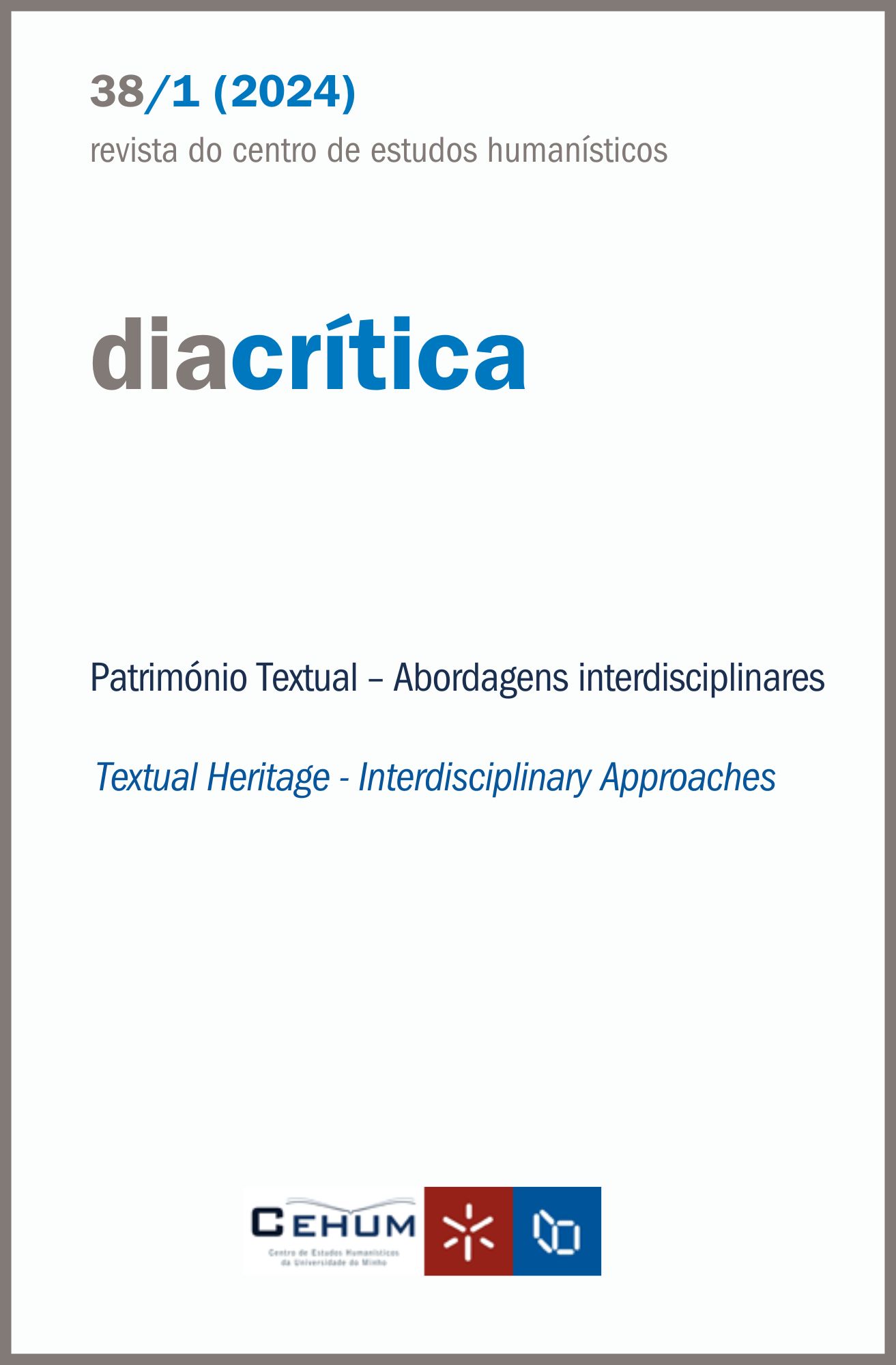Useful books for learning how to read, write and speak: A vade mecum of health and well-being
DOI:
https://doi.org/10.21814/diacritica.5599Keywords:
Conversation Guides, 19th century, Health and well-being, Nomenclatures, DialoguesAbstract
Researchers in humanities and social sciences, with an interest in the history of language usage in social contexts, can find valid sources for interdisciplinary studies within the tradition of conversation guides. Designed for foreign language teaching and learning, these resources offer empirical insights into the knowledge of history, society, ideology, and culture which are often not covered in grammar books tailored for native speakers. For instance, by making use of components of conversational data, they can contribute to contextual knowledge in the field of health, covering aspects such as the prevention and the treatment of diseases, complementing data collected in dictionaries. This study aims to focus on the discursive microstructure of the topic health in 19th-century Conversation Guides, which encompass both dialogues, such as “Inquiring about health”, “With the doctor, surgeon, dentist” and lexical repertoires, including “Accidents, diseases, and related matters” and “Remedies”. What potential lies within dialogues that encode metalinguistic behaviors, as well as terminologies concerning human body health, illnesses, and treatments, in shaping the history and historiography of linguistics? Additionally, we examine the understanding and cultural contexts that shaped these conversational customs surrounding health and well-being. While nowadays they drive the initiatives of nations, in the 19th century they acted as conduits for Enlightenment ideas and principles of Utilitarianism.
References
Alvar Ezquerra, M. (2013). Las nomenclaturas del español. Siglos XV-XIX. Liceus.
Auroux, S. (1994). La révolution technologique de la grammatisation. Pierre Mardaga.
Austin, J. (1962). How to do things with words. Oxford University Press.
Ayala Castro, M. C. (1990). El concepto de nomenclatura. Actas del IV Congreso Internacional EURALEX’90, 437–444.
Barroux, G. (2017). La médecine de l’Encyclopédie. Entre tradition et modernité. CNRS.
Bellenger, W. A., Witcomb, H., Steuer I., Zirardini, G., Pardal, R., & Moura, C. L. (1846). Nouveau Guide de Conversations Modernes ou Dialogues Usuels et Familiers Contenant en Outre de Nouvelles Conversations sur les Voyages, les Chemins de fer, les Bateaux à vapeur, etc en Six Langues français - anglais - allemand - italien - espagnol - portugais (...). Baudry, Librairie Européenne.
Berlaimont, N. de (1662). Colloquia, et dictionariolum octo linguarum, Latinae, Gallicae, Belgicae, Teutonicae, Hispanicae, Italicae, Anglicae, & Portugallicae. Apud Henricum Aertsens. (original publicado em 1530)
Chevalier, J.-C. (1968). Histoire de la syntaxe. Naissance de la notion de complément dans la grammaire française (1530-1750). Librairie Droz.
Cooper-Richet, D. (2005). Paris, capitale des polyglottes ? Edition et commercialisation des imprimés en langues étrangères sous la Restauration. In Jean-Yves Mollier, Martine Reid & Jean-Claude Yon (Dirs.), Repenser la Restauration (pp. 197–209). Nouveau Monde éditions.
D’Alembert (1894). Discours Préliminaire de L’Encyclopédie [Publié intégralement d’après l’édition de 1763 (…) par F. Picavet]. Armand Colin et Cie, Éditeurs. https://gallica.bnf.fr/ark:/12148/bpt6k75526p/f129#
Fonseca, J. (1854). Le Nouveau Guide de la Conversation en Français et Portugais, en deux parties, contenat (...). Ve J.-P. Aillaud, Monlon e Ce, Libraires de leurs Majestés l’Empereur du Brésil et la Reine de Portugal.
Gallagher, J. (2019). Learning languages in early modern England. Oxford University Press. DOI: https://doi.org/10.1093/oso/9780198837909.001.0001
Guisán, E. (2012). Direito Natural. In A. Marques & D. Pires Aurélio (Coords.), Dicionário de Filosofia Moral e Política (1.ª série). Instituto de Filosofia da Nova. https://www.dicionariofmp-ifilnova.pt/
Hamonière, G. (1840). A nova guia da conversação em ittaliano, e portuguez, dividida em duas partes (...). Na Typographia Rollandiana.
Maia, A. S. (1955). Manual prático de conversação em português e mussele dialecto do “Umbundu”. Quanza-Sul – Angola. Escola Tipográfica das Missões.
McLelland, N. (2017). Teaching and learning foreign languages. A history of language education, assessment and policy in Britain. Routledge. DOI: https://doi.org/10.4324/9781315624853
Porto Dapena, J.-A. (2002). Manual de técnica lexicográfica. Arco/Libros.
Prista, L. & Albino, C. (1996). Filólogos portugueses entre 1868 e 1943. Associação Portuguesa de Linguística.
Ramos, V. (1972). A edição de língua portuguesa em França (1800-1850). FCG.
Roquete, J. I. (1843). Guia da conversação Portuguez-Inglez, para uso dos viajantes e dos estudantes, Por ____, autor do Novo Dicionario Portuguez-Francez, contendo (...). Carlos Hingray.
Santos, J. M. (1876). Manual de conversação em Portuguez e Francez (...). Typographia da Bibliotheca Universal.
Searle, J. R. (1981). Expression and meaning. Cambridge University Press. (original publicado em 1979)
Skopek, L. (1979). Doctor-patient conversation: A way of analyzing its linguistic problems. Semiotica, 28(3-4), 301–312. https://doi.org/10.1515/semi.1979.28.3-4.301 DOI: https://doi.org/10.1515/semi.1979.28.3-4.301
Veenhoven, R. (1996). The study of life satisfaction. In W. E. Saris, R. Veenhoven, A.C. Scherpenzeel & B. Bunting (Eds.), A comparative study of satisfaction with life in Europe (pp. 11–48). Eötvös University Press.
Verdelho, T. (2011). Lexicografia portuguesa bilingue. Breve conspecto diacrónico. In T. Verdelho & J. P. Silvestre (Eds.), Lexicografia bilingue. A tradição dicionarística Português-Línguas Modernas (pp. 13–67). Centro de Linguística da Universidade de Lisboa / Universidade de Aveiro.
Verdelho, T., & Silvestre, J. P. (Eds.). (2011). Lexicografia bilingue. A tradição dicionarística Português-Línguas Modernas. Centro de Linguística da Universidade de Lisboa / Universidade de Aveiro.
Downloads
Published
How to Cite
Issue
Section
License
Copyright (c) 2024 Maria Céu Fonseca, Ana Alexandra Silva, Fernando Gomes, Maria João Marçalo, Olga Gonçalves

This work is licensed under a Creative Commons Attribution-NonCommercial 4.0 International License.










